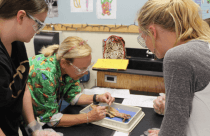Where Else Can Researchers Find Support If the Advisor Is Not Helping Enough?

Isolation, anxiousness, search for perfection, researching failures, and stress—these are only some of the many problems PhD students usually cope with at some point in their careers. Their goal is so ambitious and the process to achieve it so long and tedious that many of them deal with several problems, both emotional and academic. Some count on the help of their advisors, but not all find it. Where else can they look for it?
Academic Support
Although many advisors provide an effective writing guidance to researchers, some are not so helpful in finding optimized working systems. Therefore, many encounter problems to achieve their goals due to their lack of organization, despite having the knowledge to do it. But achieving organizational skills might not be such a big problem. Universities or research centers usually offer courses to guide students. Besides, blogs from experienced, former, or current researchers, and relevant literature can help students find their own particular system.
Other problems that usually overwhelm students and researchers is the dreaded procrastination. Relevant websites, such as Academia, can provide helpful tips.
Actually, the internet offers a huge range of websites, blogs, and forums, where researchers can share their problems and concerns. Explorations of Style: A blog about academic writing, Find a PhD, or PhD Talk are some good examples.
Emotional problems and Their Difficulties
Some advisors offer good academic guidance, but are ineffectual when a student confesses that he is having a bad time. Fellow students can be a huge support, but many have difficulties admitting that they are not making progress with their respective research. That is the reason why anonymous sources of advice such as online communities, blogs, and forums are becoming increasingly popular. Usually, the simple fact of knowing that others are experiencing the same problems as them means a lot for many students.
Two forums specially appreciated by PhD students are PhinisheD and PhDStudent Forum. Last but not least, they can also find support in social media. LinkedIn groups or Twitter (using the hashtags #phdchat and #ECRchat, for example) are becoming meeting spots for PhD students.
Enjoying the PhD Experience
Many researchers are so focused on their academic goals and overwhelmed by their responsibilities that they often forget about enjoying the experience of researching. A PhD researcher is supposed to be an intelligent, committed person who is working in something he really likes. Why do so many of them suffer of stress, anxiety, or other kinds of emotional problems at least once during their research career? Pressure or high demands from their superiors or themselves are some of the causes. Therefore, students should dedicate a part of their working schedule to solve their problems. If suffering from stress, dedicating one hour to an activity that helps in reducing it will be helpful than spending that much time working. And if suffering from anxiety, talking to a sympathetic person may help more than working as well. Or, as many PhD students recommend: If having a bad time… read PhD Comics. That always cheers me up.









